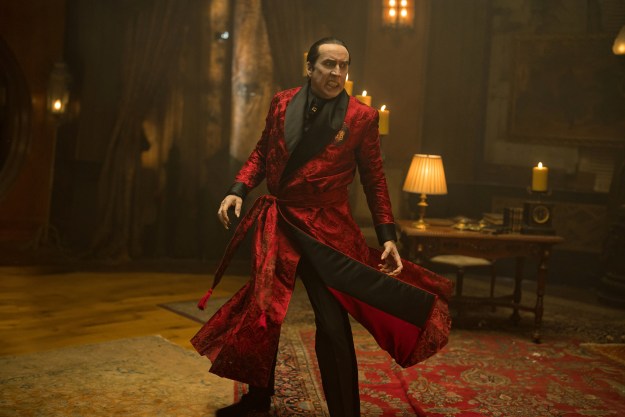
“Renfield is a cartoonishly violent horror comedy that ultimately doesn't have much to offer outside of yet another standout performance from star Nicolas Cage.”
- Nicolas Cage's scene-stealing turn as Count Dracula
- Several memorable, bone-crunching action sequences
- A consistently engaging horror/comedy tone
- Multiple one-note supporting characters
- A handful of uninteresting subplots
- A screenplay that doesn't ever feel quite as clever as it should
Renfield is a horror comedy starring Nicolas Cage as a version of Dracula that’s so hammy and over-the-top that he makes Bela Lugosi’s 1931 version look subtle. Based on that setup, it’s an easy sell. But it also begs a question that speaks to just how low the bar has fallen in recent years: What more could you possibly want from a contemporary studio comedy? For better or worse, Renfield seems to be aware of just how little it needs to do in order to deliver an experience that feels worthwhile.
There is a sense throughout the new, refreshingly lean 93-minute film that its makers felt like they’d already done 99% of their job before the cameras had even started rolling simply by casting Cage as Dracula and Nicholas Hoult as his assistant, Renfield. Entire portions of the film’s screenplay feel like untouched remnants of a first draft and, as a result, there are sequences that feel remarkably phoned-in. If that makes it seem like Renfield is just yet another mediocre, forgettable Hollywood romp, that’s because it kind of is.
There is, however, something to be said about knowing what kind of film you’re making, and there’s never any doubt that the artists behind Renfield knew exactly what movie they wanted to deliver. As disappointing as the film’s lackadaisical approach to many of its secondary plot points and characters is, it’s easy to see why Renfield‘s creative team felt like they’d already gotten as much right as they needed to when they cast its two leads. Sometimes, putting Nicolas Cage in ghost-white makeup and letting him go absolutely hog wild really is all you need to do to make your film pop.

Based on an original idea by The Walking Dead creator Robert Kirkman, Renfield follows its eponymous, immortal servant as he tries to finally carve out a life for himself after spending hundreds of years dutifully serving Cage’s narcissistic, blood-sucking Dracula. The film picks up with the duo just shortly after they’ve relocated to New Orleans following an attack by vampire hunters. While his master recovers quietly from the ambush, Hoult’s Renfield begins attending support group meetings for codependent people who are looking to get out of toxic relationships.
The meetings help Renfield feel emotionally supported, but it’s only after he saves the life of Rebecca Quincy (Awkwafina), an uncompromising cop, that he begins to feel like he deserves more than what Dracula gives him. Unfortunately for Renfield, his undying boss isn’t the type to let go easily. What follows is a battle of wills between Cage’s Dracula and Hoult’s Renfield that not only forces the latter to confront some of his deepest emotional issues, but ends up involving Bellafrancesca (Shohreh Aghdashloo) and Teddy Lobo (Ben Schwartz), the mother and son duo in charge of a dangerous crime family.
In order to combat his boss’ many attempts to physically and emotionally manipulate him, Renfield has to frequently tap into the supernatural powers that were bestowed upon him by Dracula by eating as many bugs as he can get his hands on. The film, notably, doesn’t ever go out of its way to explain why Renfield has to eat bugs in order to use his powers, which include momentary bursts of super strength and agility. Fortunately, it doesn’t really need to, either. The goofiness of Renfield’s power source ultimately matches the film’s cartoonish style of violence well.

While his powers make Renfield feel like yet another addition to the growing list of contemporary cinematic superheroes, the film offsets the overly familiar comic book elements of its story by leaning all the way into a Sam Raimi-esque style of blood-soaked ultraviolence. Over the course of Renfield’s runtime, Hoult’s undead vampire servant not only bisects certain corrupt law enforcement officials, but also cuts some gangsters’ hands off with serving plates and rips the arms clean off others. These moments of violence are brought to life with zealous glee by director Chris McKay (The Tomorrow War), whose decision to fill Renfield’s action sequences with literal eruptions of blood helps emphasize the film’s comedy/horror tone.
The same goes for Cage’s predictably scene-stealing performance as Dracula, who manages to come across as absurdly needy and legitimately terrifying at different points throughout the film. Cage, who spends most of Renfield’s first half covered in prosthetics that make him look like he would have fit in just fine on the set of John Carpenter’s The Thing, achieves a duality with his performance as Dracula that is both genuinely off-putting and hilariously welcome. With his pointed teeth and silent movie-inspired layers of makeup, Cage’s Dracula masterfully rides the line between spoof, monster, and wannabe member of the ’70s rock band KISS.
Not all of Renfield’s cast members fare as well as Cage, though, as the shortcomings of their performances are largely due more to faults in the film’s screenplay than anything else. That’s especially true for Awkwafina’s Rebecca, who is written as a one-note symbol of unrelenting justice and is, consequently, played as such. Talented performers like Adrian Martinez and Aghdashloo are similarly hung out to dry and forced to play uninteresting supporting characters that offer them next-to-nothing to do throughout Renfield.

As the film’s titular antihero, Hoult embraces both the morally gray and pathetic aspects of his character. The actor has, in recent years, repeatedly proven himself one of the few performers who is capable of coming across on-screen as simultaneously pitiful and dangerous. That talent has, perhaps, never been on display as much as it is in Renfield, which often asks him to bounce fluidly between moments of confident kickassery and fumbling wimpiness. Hoult, to his credit, does so with surprising ease.
Together, he and Cage help lift up Renfield from the depths of total mediocrity. The film is, to be clear, nowhere near as clever or well-executed as it could have been. There are moments throughout the film, in fact, where its budgetary constraints and the limitations of Ryan Ridley’s screenplay are painfully clear. Every time Cage waltzes across the screen as Dracula, though, Renfield still manages to feel like a worthwhile exercise. All of which is to say that, even though its bite isn’t quite as sharp as some may have hoped, Renfield does succeed at sinking its teeth into you.
Renfield is now playing in theaters. For more about the movie, be sure to check out Renfield’s ending, explained.



